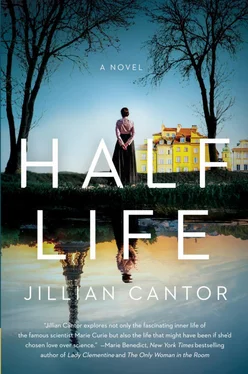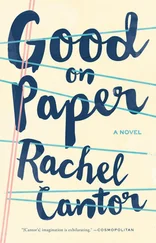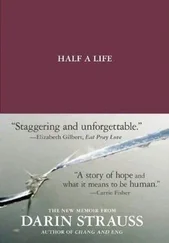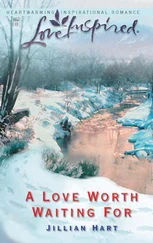“Yes,” Pierre says. “But I mean permanently. Forever.”
“Don’t be ridiculous,” I say. “Nothing is forever.”
“I beg to differ,” Pierre says. “What about atoms?”
It’s hard to tell whether he’s teasing now, or whether he’s hurt that I’ve refused him yet again. But when I glance at him, the corners of his lips upturn ever so slightly above his beard. This conversation, this proposal of his, is far from over in his mind.
“Oh, Pierre,” I say, shaking my head. But I am still biting back a smile as I turn my attention to the steel and the fire iron.
ON SATURDAY MORNING, PIERRE AND I TAKE A BIKE RIDE TO the Bois de Vincennes, as we have been doing each weekend the weather is warm enough, riding on old bicycles that belong to him and his brother, Jacques. I pedal ahead of him, my hair coming loose from my bun, blowing back behind my shoulders as the wind whips around my face. I enjoy knowing that he is here, riding with me, but also that I am faster.
“Slow down,” Pierre calls from behind me. But he’s laughing.
I’m breathless and sweating even though the almost-spring air is cool and crisp. Away from the lab, and science, my mind is a sieve, and time and knowledge slip away, my head gloriously empty for the afternoon. I pedal and pedal like fire ripping through accelerant. Past the gates of the park and the still bare-branched cherry trees.
As we near the water, I finally do slow down, and Pierre catches up. I hop off, lay my bicycle on its side, and sit down by the edge of the lake, resting my sweaty face against the cool edge of my sleeve. Pierre is a moment behind me, and when he stops, he pulls a bouquet of white daisies from his bicycle basket, then holds them out to me, like a prize for reaching the lake first. I take the flowers and our fingertips touch, sending a current of warmth up my hand, my entire arm.
He sits down next to me, close enough so our shoulders touch. “Together,” he leans in and says softly, next to my ear. “Inside of the lab and out.”
LATER THAT AFTERNOON, I TAKE THE OMNIBUS TO BRONIA’S apartment in La Villette for dinner. I haven’t seen her much in the few months since I’ve been back from Poland, as I’ve been busy in the lab. And yet I am not thinking about her or my little niece, Lou, as I should be on the way to her home. Instead, the entire carriage ride, my mind is back at the lake, with Pierre, the feel of his whisper on my ear. Together. I have to forget about Pierre, and I promise myself I won’t even bring him up at dinner.
But the first thing Bronia says when I walk inside her apartment is, “That man loves you. Don’t be a glupi .”
I am no fool, but I’m caught off guard by my sister’s words. “Whatever do you mean?” How does Bron know about Pierre? I have made a point not to mention him, other than as a scientist I share a lab with.
“Monsieur Curie came to visit with us one night last week. Mier invited him for dinner.”
“Mier invited him?” What business did my brother-in-law have doing that? It feels a strange invasion of my privacy, like these men, they plucked a secret from my lab, stole it away from me. And now my face burns hot with anger.
“Monsieur Curie wrote us a few times over the summer when you were away, telling us how much he wants to marry you. And he kept writing after you came back. We thought we’d better meet him, so Mier invited him. I made my mushroom soup.”
At the mention of Bronia’s grzybowa my mouth waters, and I’m both jealous and annoyed that I hadn’t been invited to this dinner, too. What right did they have to eat without me? To talk about me behind my back?
“Don’t be angry.” She puts her hand on my shoulder gently. She may be a real mother now, but she is still, also, my sister-mother. “We greatly enjoyed Monsieur Curie’s company. The way he went on and on about all your work together in the lab. Well, he sounded just like you.” She laughs .
“We work quite well together in the lab,” I say. “That is not the same as loving someone.”
“Isn’t it?” Bronia asks, raising her eyebrows.
I shrug, because it doesn’t matter. We both know, as soon as I’m accepted for a teaching position at the university in Krakow, I’ll move back to Poland. Pierre has work here, in France. “Pierre is French. I’m a Pole, Bron. I belong in Poland. You know that.”
Bronia nods, understanding. Poland is her homeland, her birthright, too. “But you cannot choose your country over all else. It’s not healthy,” she says.
“ Choose? What other choice do I have?”
There is always a choice. But I will not choose a man, a marriage, over my family, over my country.
“You could choose to be happy,” Bronia says. She picks little Lou up off the floor, where she’d been playing with spoons, and hugs her daughter close to her chest, kisses the top of her head. Bronia had planned to return to Poland after she got her degree, too, but then she met Mier, who can’t go back to Poland without risking arrest due to his dissident status there, and now she has a family and a career. Here. But she is always talking about how much she misses Poland, how much she longs to go back there.
“I will be very happy in Poland,” I say. Being back closer to Papa and Hela and the country that feels like home, that is what I want.
Bronia raises her eyebrows, gives me a look over Lou’s head.
Anyway, what kind of a choice is that? To be happy. What is happiness but something unquantifiable, unmeasurable? It seems a terrible way for a scientist to make a decision about one’s life, one’s future.
“MARRY ME,” PIERRE SAYS AGAIN, EXACTLY ONE WEEK AFTER he’d last asked. We are leaving the lab for the night, and Pierre has turned to lock the door behind us, then stops, turns back to me, and proposes, as if he’s forgotten what he’s supposed to be doing halfway through. Or as if marrying me now consumes his mind, making him obsessive and forgetful, the way our work on magnetism has been doing to him for months.
I reach my hand up, touch his beard gently with my fingers. Though he is thirty-five years old, his face still has a boyishness to it, a lightness that my own twenty-seven-year-old face is missing. Perhaps that’s the product of growing up in France, as opposed to Russian-controlled Poland, of having enough to eat, and the money to pay for education, the freedom to get that education when he was ready for it. Pierre’s father is a doctor, and his parents live in a beautiful home on the outskirts of Paris in Sceaux. They are lovely, warm and welcoming to me when I have gone with Pierre to dinner there. He and his older brother, Jacques, grew up never wanting. Pierre and I were born into different worlds, we belong in different worlds, and that is never going to change no matter how much he might wish it to.
Pierre reaches his hand up and catches mine on his face. We stand like that for a moment, outside our unlocked lab, neither one of us speaking or moving. Until finally Pierre says, “Before you say anything, I’ve been thinking about this quite a lot, and I’ve decided I’ll move to Poland with you.”
“What?” His words don’t make any sense, and I pull away from his face. Whatever would he do in Poland? He doesn’t speak Polish, and he would be unable to work in a laboratory there.
“If that is what it takes for you to be my wife,” Pierre says. “I’ll give this all up.” He gestures to the lab, behind us. “I love science, but I don’t need it the way you do. You can be a scientist in Poland, and I will be… your husband.”
“But what will you do in Poland?”
“I don’t know… I’ll teach French,” Pierre says. “But it doesn’t matter what I do. I don’t care. Don’t you see that? I just want to be with you, Marie Sklodowska. I love you.”
Читать дальше









